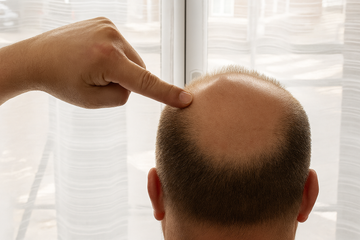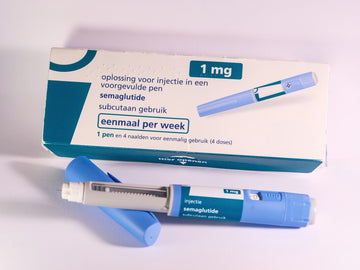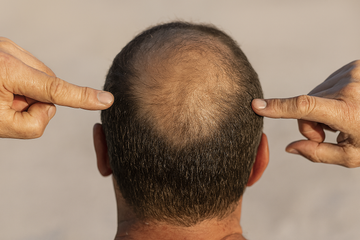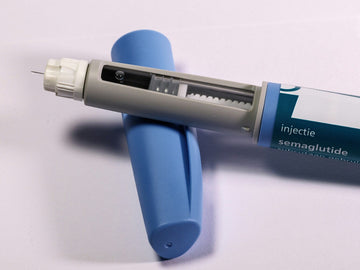Can Hard Water Cause Hair Loss?

Marinella Helera • Jun 17, 2025
Tired of seeing a clump of hair in your hand every time you take a shower? It can not only be frustrating, but also demotivating.
At that point, many people start looking for answers elsewhere. If nothing in your haircare routine or lifestyle has changed, but the hair fall continues to increase, the root cause may be hard water. This concern is common, particularly in areas with high mineral content in the water.
Wondering how can hard water cause hair loss?
Hard water doesn't directly harm the follicles, but it still affects overall hair health. Let's take a closer look.
What Is Hard Water and How Does It Affect Hair?
Hard water contains high levels of minerals, such as calcium and magnesium. These minerals are safe to consume, but they can harm your hair and skin.
When you wash your hair, the minerals stick to each strand. Over time, this buildup causes hair to feel dry, appear dull, and become more difficult to style. The mineral residue can also accumulate on your scalp, making it more difficult to wash out shampoo and conditioner. This often leaves hair feeling coated or greasy, even after washing.
The mineral buildup also blocks hair follicles. This can irritate your scalp and cause your hair to weaken. Some people notice more breakage or hair that feels thinner, not because it's falling out at the root, but because the strands are becoming weaker.
How Hard Water Affects Your Hair
Is hard water bad for your hair? Research and real-world experience say yes, and not just in obvious ways.
Repeated exposure to water with high mineral content can gradually affect hair structure. Over time, calcium and magnesium from hard water bind to the surface of hair strands. They don't just sit there, but also alter the texture. The outer layer of hair becomes uneven, affecting both its appearance and texture when touched.
One visible effect is thinning, not from the root, but from surface damage. Hair strands can lose their smoothness, making them more susceptible to weakening and breaking in the middle. With excessive breakage, your hair may start to appear thinner, even if it's growing normally.
A study involving 15 female participants directly tested this. Researchers collected hair strands from these healthy female volunteers and divided each sample into two sets. One set was washed with hard water, and the other with distilled water, over a 30-day period. The results showed that hair washed in hard water became visibly rough and decreased in thickness. That change in structure means weaker, more fragile strands.
Furthermore, the use of hard water also affects scalp health. Some people can notice more buildup at the roots or a feeling of heaviness after washing their hair. This buildup blocks hair follicles or disrupts the scalp's natural oil balance, which can affect how new hair grows. While these effects may not be apparent overnight, they accumulate with daily exposure.
What Does Science Say About Hard Water and Hair?
A study examined the impact of hard water on hair strength. Researchers collected hair samples from 70 men living in areas with low water hardness. They divided each sample into three parts. One part was left untreated as a control. The second part was washed with deionized (soft) water. The third part was treated with hard water taken from the area with the highest mineral content.
The study measured the tensile strength using a specialized machine. The results showed a clear difference. Hair exposed to hard water had a significantly lower tensile strength compared to both the control group and the hair washed with deionized water. On the other hand, hair treated with deionized water showed no significant change compared to untreated hair.
These findings suggest hard water can weaken hair over time. However, scientific studies sometimes differ from what people experience in daily life. Many individuals and experts report issues such as dryness and buildup, which may not always be evident in tensile strength tests but still impact hair health.
How to Identify Hard Water Damage on Your Hair
Hard water can have a gradual yet lasting impact on your hair over time, causing changes that may appear to be normal wear and tear. Recognizing the specific signs of hard water damage helps you address the problem before it worsens. Some of the common symptoms are the following.
-
Dullness and Lack of Shine
Minerals in hard water stick to hair strands, making hair look dull and lifeless. This buildup blocks light, causing hair to lose its natural shine and appear flat over time. Even regular washing won't entirely remove this layer, leaving hair looking weighed down.
-
Increased Tangling
Hard water minerals roughen the hair's surface. This makes strands catch and tangle more, causing knots. Tangled hair is more likely to break during brushing or styling. Over time, this can cause uneven ends and increased hair loss due to mechanical damage.
-
Scalp Flakiness
Mineral residue can irritate the scalp, causing dryness and flakes. These flakes look like dandruff but usually come from mineral buildup, not scalp problems. The irritation can also cause itching.
If left unaddressed, this irritation can also contribute to chronic scalp discomfort.
-
Reduced Effectiveness of Hair Products
Minerals form a layer on hair that stops shampoos and conditioners from working well. You may notice your hair doesn't feel clean or soft even after washing. This is a clear sign of hard water damage.
Preventive Measures and Treatments
Hard water doesn't only change how your hair looks; it can also affect how it feels and overall manageability. However, there are practical ways to prevent and reduce damage. Some of them are the following.
Water Softening Solutions
One of the most effective ways to reduce hard water damage is by changing how water reaches your hair. Install a whole-house water softener system to remove minerals like calcium and magnesium from your water. This prevents buildup on your scalp and hair.
If a complete system replacement is too costly or not possible, a showerhead filter is a good alternative. It connects to your shower and reduces the amount of minerals in the water. While not perfect, it can make your hair feel softer and cleaner over time.
Hair Care Practices
If you can't change your water, you can still care for your hair in ways that reduce the damage. Use a clarifying shampoo once a week to help maintain healthy hair. It removes mineral buildup and keeps your hair from feeling rough or heavy.
After clarifying, apply a deep conditioner. Hard water can dry out hair, so it's essential to replenish the moisture. Select a product with ingredients like coconut oil, shea butter, or glycerin for enhanced hydration.
You can also wash your hair with a diluted solution of apple cider vinegar. Mix one part vinegar with two parts water and pour it over clean hair. This restores your scalp's natural pH and removes leftover minerals. For optimal results, repeat this process once a week.
Aloe vera is another good option. It calms itchy scalps and adds moisture to the hair. You can use fresh aloe gel before washing your hair or buy products that list aloe as a key ingredient.
Introducing Try-Spartan's Hair Loss Solutions
Hard water can damage hair over time, but the right products can help reverse its effects. Try Spartan's hair care line, which supports healthier hair from root to tip. Each product targets a specific issue caused by hard water. Let's take a look:
-
Spartan Root Activator Spray reactivates dormant hair follicles. The formula combines proven ingredients that support blood flow to the scalp and encourage stronger, thicker growth. With consistent use, users may notice fuller coverage and less visible thinning.
-
Spartan Root Activator Shampoo does more than just clean. It gently removes the buildup left by hard water while strengthening the hair strand itself. The shampoo works well for anyone dealing with dryness, brittleness, or excess shedding caused by mineral residue.
Conclusion
What does hard water do to your hair? It doesn't always cause hair loss directly, but it can lead to damage over time. Minerals like magnesium and calcium can accumulate on your scalp and hair strands. This buildup often causes dryness, tangles, and breakage, which make your hair appear thinner or rough.
Signs such as dullness, flakes on the scalp, or hair that won't stay clean indicate the presence of hard water. You can test your water or install a shower filter to reduce mineral exposure. Additionally, using the right hair products can mitigate the damage.
Try-Spartan offers a range of products designed to support your hair in these conditions. The regrowth serum works at the root level to boost growth. The strengthening shampoo helps clean while protecting strands. The scalp therapy soothes irritation and maintains your scalp's health.
Better hair care begins with knowing what's affecting it. If hard water is part of the problem, it's worth taking steps to protect your hair.








